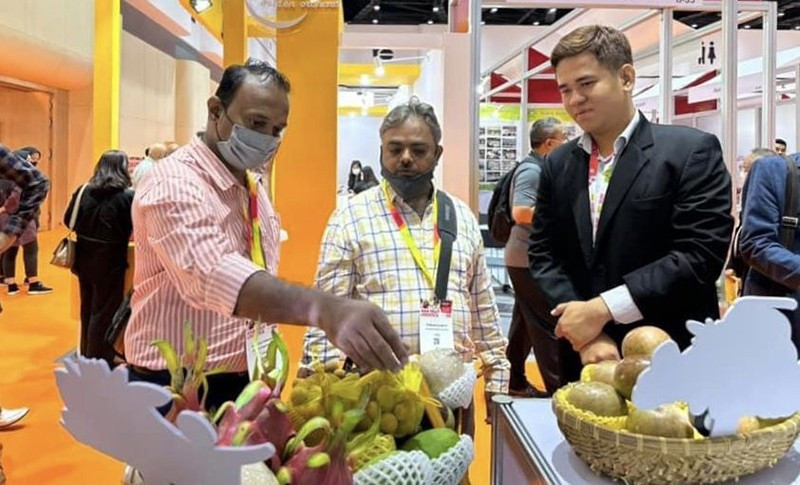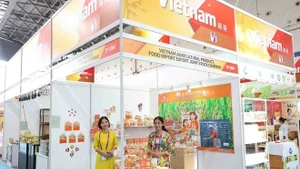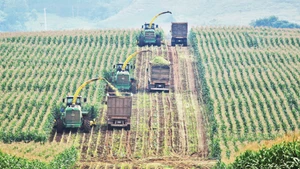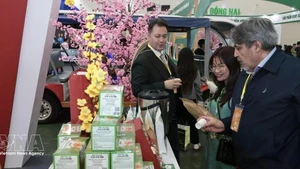In 2022, Vietnamese fruits and vegetables were mainly exported to the following markets of China, the US, the Republic of Korea, Japan, and Thailand. While most of the markets recorded export growth, the Chinese market dropped sharply, however it still remains the largest fruit and vegetable export market of Vietnam.
The export of fruits and vegetables to China reached more than 1.5 billion USD in 2022, down nearly 20% compared to 2021 and accounting for 45.38% of the country’s total fruit and vegetable export turnover. Meanwhile, the US market posted export turnover of more than 247 million USD, up 11.15%, and the Republic of Korean market reported export turnover of nearly 181 million USD, up 14.83% compared to 2021.
2022 is also the year of successful market opening for many fruit and vegetable products, such as the signing of protocols to officially export several fruits and vegetables to China such as: durian, banana, and sweet potato. China also agreed to pilot the official import of passion fruit and fresh chili peppers. In addition, pomelos were also accepted for official export to the US and New Zealand.
Most recently in November 2022, Japan officially approved Vietnamese longan to be imported into this market after six years of negotiations. In early January 2023, the first 10 tonnes of fresh longan of Hoang Phat Co., Ltd., based in Long An Province, were exported to the Japanese market. After this batch of longan, the company is expected to regularly provide fresh longan by sea and air to Japan every month. Longan fruit must go through many strict evaluation processes under the supervision of Japanese experts to be exported to the Japanese market.
The Plant Protection Department is also implementing solutions to support the granting of planting area codes, packing facility codes, and the implementation of food safety regulations to quickly increase longan export output to the Japanese market. So far, there have been four types of Vietnamese fruits exported to the Japanese market, namely: dragon fruit, mango, lychee, and longan.
Also in early January 2023, the People’s Committee of Cao Phong District, in collaboration with the Department of Agriculture and Rural Development of Hoa Binh Province, RYB Joint Stock Company, and Cao Phong Company Limited, held a ceremony to export the first batch of 7 tonnes of Cao Phong oranges to the UK. This was also the first time Cao Phong oranges reached out into the world market, promising larger orders in the near future.
To boost the export of fruits and vegetables in 2023, one of the most important requirements is to quickly adapt to and meet the new requirements on quality, food hygiene and safety, the registration of export enterprises according to the rules of each country, and the expansion of the number of planting area codes and packing facilities.
According to the Plant Protection Department, as of the end of November 2022, Vietnam has granted 5,325 planting area codes (approximately 254,137 ha) for agricultural exports in 55 provinces and cities and 1,438 packing facility codes in 36 provinces. Director of the Post-Import Plant Quarantine Centre 2 under the Plant Protection Department Phan Thi Thu Hien said that planting area codes and packing facilities are mandatory regulations of many importing countries around the world. The planting area codes are issued periodically for a limited time depending on the requirements of the importing country.
These codes must be recognised by importing countries and monitored by the management agencies. The granting of planting area codes and packing facilities is not only useful for monitoring the production situation, controlling product quality, and serving product traceability, but it also has great significance in transforming thinking and raising farmers’ production awareness in a more professional manner.
According to General Secretary of the Vietnam Fruit and Vegetable Association Dang Phuc Nguyen, Vietnam’s fruit and vegetable export industry has many opportunities for breakthroughs in 2023, especially in the Chinese market. Furthermore, logistics difficulties are expected to be removed and freight rates are forecast to decrease, which will certainly have a positive impact on Vietnam’s fruit and vegetable exports.
The fruit and vegetable industry is also taking better advantage of the free trade agreements that Vietnam is participating in, such as the EU-Vietnam Free Trade Agreement (EVFTA), the Free Trade Agreement between Vietnam and the United Kingdom of Great Britain and Northern Ireland (UKVFTA), and the Regional Comprehensive Economic Partnership (RCEP), so there is a large opportunity to export fruits and vegetables to major markets such as Europe, the United Kingdom, Australia, and New Zealand. Therefore, the current important issue for the industry is to improve product quality and implement traceability to meet the needs of each market.
















